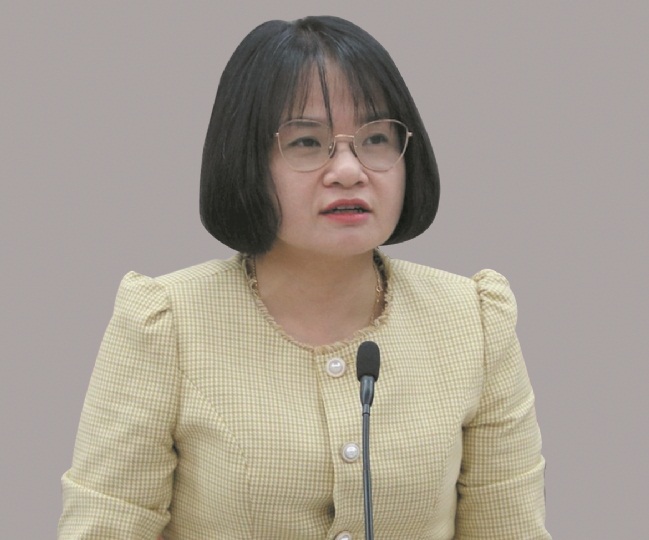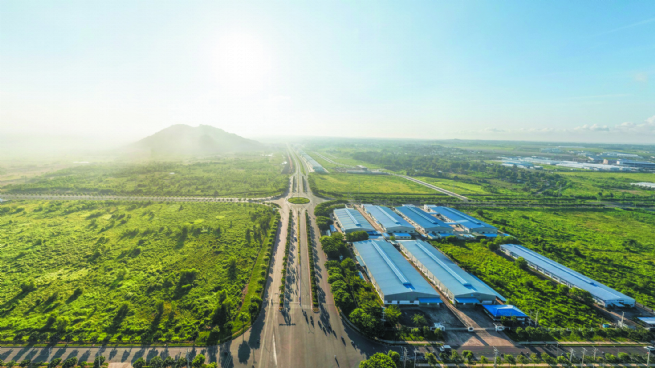Clearing Bottlenecks, Supporting Sustainable Business Development
In 2025, alongside restructuring and streamlining its administrative system for greater efficiency, flexibility, and modernity, Dong Nai province will address institutional bottlenecks, significantly improve the investment and business environment, and reform its selective investment promotion model. To find out more, Vietnam Business Forum has an exclusive interview with Ms. Truong Thi Huong Binh, Director of the Dong Nai Department of Finance.
Dong Nai is aiming to implement many solutions and actions to accelerate public investment disbursement in 2025 and the following years. How is the Department of Finance helping to quicken this process?
Dong Nai province sees speeding up public investment disbursement as a key political task, a top priority to create growth momentum, clear infrastructure bottlenecks and spread development to industries and fields.

Being aware of its assigned responsibility, the Department of Finance actively advises and coordinates in the province's public investment plans. Specifically, the department proactively plans quarterly investment progress inspection in each investor; leads and advises the establishment of working groups to inspect slow-moving projects and directly works with relevant units to clear obstacles in land compensation, legal procedures and contractor selection. The agency advises the province to disclose the disbursement results in a public and transparent manner, clearly naming good performers and bad performers as well as the responsibility of related persons.
Additionally, the department advises the Provincial People's Committee to actively review and transfer capital from slow disbursing projects to good ones and coordinates with related bodies to arrange the fund in the right order of priority and schedule, not to let it be suspended or wasted.
Investment preparation has been strengthened by reviewing and guiding investors to improve the quality of investment proposal documents, technical design documents and feasibility study reports. The department proactively assesses the capacity of consultants and constructors and advises on the exclusion of weak units from the participant list of bid packages in the province.
In addition, the department enhances the role of intersectoral coordination, reinforces coordination with other agencies like the Agriculture and Environment Department, the Construction Department and the District People's Committees to promptly resolve land, construction materials, market prices and other matters. At the same time, it proposes a mechanism to streamline the appraisal - approval process and speed up the progress of project preparation and implementation.
In particular, the Department of Finance counselled the Provincial People's Committee to issue Directive 09/CT-UBND dated December 16, 2024, clearly stating that “Public investment disbursement reaching 95% or more of the budgeted target is the measuring indicator of task performance of each unit and official.”
The department also recommends organizing periodic supervision, handling officials failing to complete their tasks while facilitating dynamic and effective individuals and units.
What do you think about Dong Nai’s 35-year FDI attraction journey since the first project was licensed on September 30, 1989?
Dong Nai's 35-year foreign direct investment (FDI) attraction journey is marked with many important milestones and illustrates the province’s pioneering and strategic role in the country’s industrialization and modernization.

Since the first project was licensed on September 30, 1989, Dong Nai has become one of the biggest recipients of FDI funds in the country with 1,667 valid projects and over US$34.84 billion from more than 45 countries and territories. Leading investors include South Korea, Japan, Taiwan, Singapore and the United States.
FDI has played a key role in boosting GRDP, industrial, export and budgetary growth and contributed nearly 30% of the province’s gross regional domestic product (GRDP). The FDI fund also stimulates economic restructuring and modern industrial park development, creates ripple effects on urbanization, technical and social infrastructure development, provides jobs for more than 500,000 workers, and improves the quality of human resources.
Particularly, Dong Nai takes the lead in planning and developing a synchronous and modern industrial park system and creating a foundation to further drawing high-quality investment capital in the future.
The implementation of the Dong Nai Provincial Planning for the 2021-2030 period, with a vision to 2050, opens up a lot of breakthrough opportunities but requires higher-quality investment and greener business development. So, how is the Department of Finance helping realize these goals?
The Dong Nai Provincial Planning for the 2021-2030 period, with a vision to 2050, clearly underscores sustainable development driven by high-tech industry, logistics services and smart cities, aiming for net zero emissions by 2050.
The Department of Finance has advised on the synchronous implementation of solutions to realize these goals:
First, selectively attracting environmentally friendly high-tech FDI projects, especially in semiconductor, automation, AI, aviation and supporting industries. Labor-intensive and environmentally polluting projects are no longer approved.
Second, supporting existing enterprises to adopt green transformation, such as investing in rooftop solar power systems, wastewater recycling, and clean production technologies. The ecological industrial park model is being gradually implemented.
Third, accelerating administrative procedure reform, clarifying planning information and investment project portfolio, and applying digitalization in investment profile management to better serve investors.
Fourth, expanding business connection and support, especially for large investors from Japan, South Korea, the EU, the USA and other countries, to listen to their opinions, remove obstacles and build “concurring from idea to operation" policy and advancing towards sustainable and long-term development goals.
Dong Nai is entering a period of strong transformation from "attracting as much as possible" to "selectively attracting quality, green and innovative projects". The Department of Finance will continue to be the core force in creating an attractive, transparent and effective investment environment and actively contributing to sustainable development goals.
What are your perspectives on the implementation and effectiveness of business support plans and projects in Dong Nai at present? What are the "bottlenecks" that need to be resolved to make those plans and projects more effective?
Dong Nai has launched many business support programs with a multi-dimensional approach and provided support in policies, techniques and markets while bolstering connections between domestic and foreign business communities. Some typical programs include:
The small and medium-sized enterprise (SME) support project for the 2021-2025 period focuses on providing training on business governance, supporting access to finance through bank-business connections, and supporting domestic and foreign market expansion.
Supporting comprehensive digital transformation through training courses, personalized consulting for each business, supporting software costs, and applying technology in production and management.
Promoting the OCOP Program, developing key products associated with clean agriculture, high-tech agriculture and sustainable value chains.
Organizing trade fairs, trade connection conferences and participating in domestic and foreign investment promotion forums to help businesses expand their partner network and seek export markets.
When carrying out business support plans and projects, Dong Nai has clearly figured out some bottlenecks that need to be removed to make support policies more effective as follows:
Many small and micro businesses still find it hard to access preferential loans, lack collateral and fail to meet loan criteria. They also do not fully grasp information about support programs in place.
The land in industrial parks is mainly allocated to large-scale projects rather than SMEs and innovative startups.
Human resources for enterprises are insufficient, both in quantity and quality, especially in highly skilled workers and workers with management skills, foreign languages and adaptability to new technologies.
The province is developing a SME project for the 2026-2030 period with an increased focus on improving support quality. The emphasis is placed on:
Supporting enterprises in technological innovation, advanced technology transfer and deep participation in the global value chain.
Increasing support for digital transformation, artificial intelligence, big data and e-commerce application in business operations.
Developing modern and transparent corporate governance capacity, towards ESG standards.
Encouraging innovative entrepreneurship, especially in high technology, digital agriculture, circular economy and climate-resilient business models.
Dong Nai province will also strengthen coordination among relevant agencies and localities to effectively apply policies and make sure that businesses can easily access, use and develop in a comprehensive, effective and sustainable support ecosystem.
Thank you so much!








